
Community members gather during a Puente Human Rights Movement training session. (Analisa Valdez / CALÓ News)
Dozens of community members poured into the offices of Puente Human Rights Movement in central Phoenix on a late Wednesday afternoon in June.
Chairs were set up in their main hall in front of a projector screen, the words “Puente Hotline: 480-506-7437, See something, Say something” projected across it from a presentation intended to offer individuals present with knowledge, tools and resources needed at a time when immigrant and Latino families are being targeted by the federal government.
With a surge in Immigration Customs and Enforcement (ICE) raids taking place across the Valley — with masked agents conducting detainments at workplaces, businesses, homes and even following dismissed hearings at Phoenix Immigration Court — local organizers, like Puente, have become their communities’ latest defense.
In an effort to combat the Trump administration’s swift enactment of the President’s mass deportation efforts, several groups, movements and activists across metro Phoenix have started accompaniment and training programs amid arrests witnessed across town.
Among them is “Migra Watch,” a rapid-response initiative started by the Puente in partnership with the Borderlands Resource Initiative and over a thousand trained volunteers. This initiative offers free sessions open to the public, geared towards teaching community members how to recognize ICE, report sightings and interact safely when watching a detainment happen.
“We have been here because this has always been a need. It's not under just this [presidential] administration,” Alejandra Espinoza, a programs coordinator with Borderlands, said.
“I think it's really important for us as a community to be consistent and to show our directly impacted people that we're here for them. We're here to offer the support. We're here to be resources because it is a very difficult time for a lot of people right now. People feel very scared, and for us to have these types of events as a way for the community to plug in is one of those methods that people can see that they're not alone,” Espinoza said during the community training event in late June.
The two organizations have also initiated an accompaniment program designed to escort individuals summoned to immigration court in an effort to prevent them from being detained by ICE after their cases are dismissed.
“Whether it be through social media or [the] news, folks see a lot of the atrocities; for lack of a better word, that's what it is. It's ripping families apart, being very cruel… but then they see that… they have a space, and I think that that's what we are able to provide here at Puente,” Mitzi C., an organizer with Puente, said. “It's a really great and powerful way for them to build community and build people power.”
Despite the activity, Mitzi C. said the organizing isn’t new. “This isn’t our first rodeo,” she said, signaling to the “show me your papers” law that passed in 2010.

Puente Human Rights Movement prepares its space for a community training. (Analisa Valdez / CALÓ News)
Following the introduction of Arizona’s SB 1070 in 2010 — which allowed police to stop people based on racial profiling and demand to see their immigration documents — many Phoenix pro-immigrant coalitions organized in retaliation to the predatory policies that targeted people of color at over twice the rate of any other race, aside from Native Americans that were over three times more likely to be stopped by Arizona Department of Public Safety (DPS) officers, according to a published report by the American Civil Liberties Union (ACLU) of Arizona.
“Under SB 1070 we saw a lot of community raids, for lack of a better term, and a lot of which police officers and sheriffs were using their authority and resources to conduct immigration enforcement or otherwise assist with immigration enforcement,” Noah Schramm, a political strategist with the ACLU of Arizona, said. “We still see it, though to a lesser degree, since parts of SB 1070 were struck down by the Supreme Court, and I think it's something we're very concerned about today. Probably some of the most intense enforcement has been happening in California, where I think we're seeing one of the closest analogs we've seen in a while to the SB 1070 days in Arizona.”
The ACLU of Arizona — which recently spoke at the Phoenix City Council meeting in favor of a locally submitted safety resolution and was supported by several local community organizations — is known for challenging local and state legislative issues that upend the liberties of all citizens regardless of status, as well as working hand-in-hand with many community organizations on the ground, whether it’s through advising or providing resources, similar to those offered by the groups themselves to every day community members.
“We do a number of things. We have available ‘know your rights’ information for the community on our website that we work with partners to distribute to make sure that people in Arizona, and the various community organizations that serve them, have access to the right information about what rights they have in certain situations, what they are and aren't allowed to do, and what isn't advisable,” Schramm said. “Our partner organizations have a lot of expertise and resources that, you know, sometimes we don't have, and then sometimes we have expertise and resources that help fill gaps and help us press our advocacy forward.”
Using key takeaways from ACLU advising and other partnerships with legal clinics, Phoenix organizations have established a safety net network that community members at risk of harassment, detainment and deportation can rely on.
Connecting people in need to legal assistance is just one of the many ways groups and movements like Living United for Change in Arizona (LUCHA), Mass Liberation Arizona, Trans Queer Pueblo, Puente, Borderlands and many others have helped uplift their communities during a time when witnesses are documenting their local police department assist ICE agents.
“I think it's really important to know that this is a community-wide effort. We just have two orgs today that were doing the training, but we're connected to so many community orgs all across the Valley. We're connected to orgs across the border, orgs down in Tucson and Flagstaff and Yuma,” Beth Strano, the executive director at Borderlands, who has prior experience working at the Welcome Center, an asylum for migrants released by U.S. Border Patrol or ICE, said. “It takes all of us, because all of us see something. We figure out something that works, we share it, right? We get stronger and stronger. We're not representative of the whole movement, right? The movement is large.”

Community members gather during a Puente Human Rights Movement training session. (Analisa Valdez / CALÓ News)
Since starting their own variation of this initiative — similar to the many programs run by different organizations across Arizona — Puente has helped train over 1,000 community members and continues to see a growing number of people attending these organized presentations.
“This iteration of ‘Migra Watch’ is a fairly new project for our local community, but I've been doing community defense organizing for 20 years, and I worked really closely with migrants,” Strano said. “You meet so many people, but you're just a step in their process. You're not an important part of the story. You're just one little intersection, but if you have that intersection, then you have an opportunity to maybe give them some information, give them some resources that they can carry forward, that might make their journey a little bit easier. And I always feel like if you have that opportunity to help, then you also have the obligation to do it.”
In addition to the informative in-person sessions, which are announced across their social media platforms, Puente and Borderlands also disseminate local ICE watch updates on their Phoenix Rapid Response Instagram page. They verify sightings of ICE and DHS agents that are called into their “Migra Watch” hotline at (480)-506-7437.
“I think having eyes and ears and folks out there providing support has made a huge difference in the numbers and the strategy that the administration is using as well,” Mitzi C. said. “People power is important, and we can build that, and we can build that through community. And although a lot of things seem to be against us, we are resilient, and if we come together in this power in numbers, we can continue to help one another.”
Analisa Valdez (she/her) is a freelance journalist based in Phoenix. Her reporting includes community & culture, social justice, arts, business, and politics.

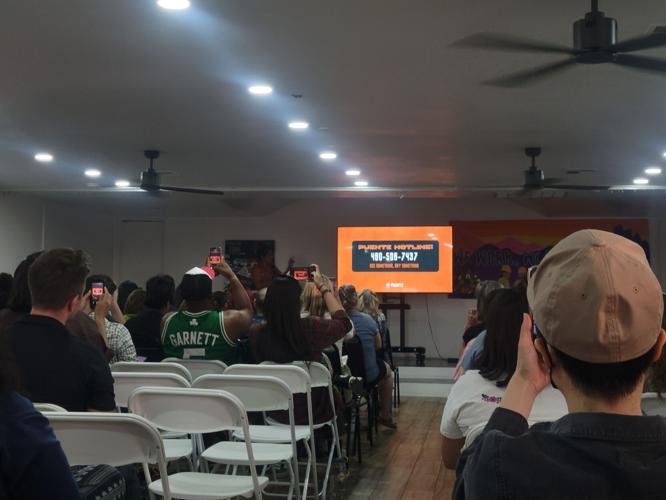

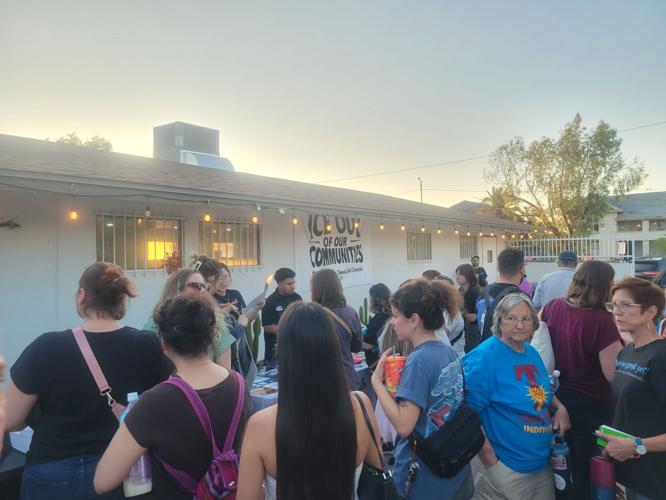
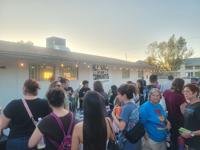
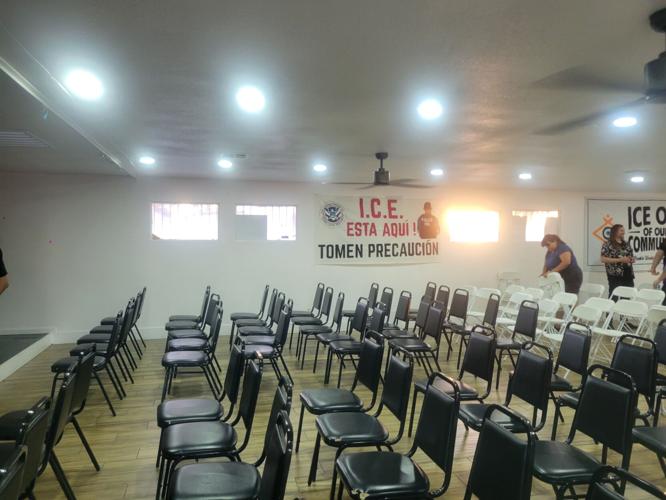


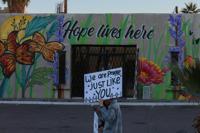





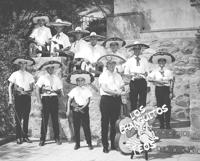


(0) comments
Welcome to the discussion.
Log In
Keep it Clean. Please avoid obscene, vulgar, lewd, racist or sexually-oriented language.
PLEASE TURN OFF YOUR CAPS LOCK.
Don't Threaten. Threats of harming another person will not be tolerated.
Be Truthful. Don't knowingly lie about anyone or anything.
Be Nice. No racism, sexism or any sort of -ism that is degrading to another person.
Be Proactive. Use the 'Report' link on each comment to let us know of abusive posts.
Share with Us. We'd love to hear eyewitness accounts, the history behind an article.